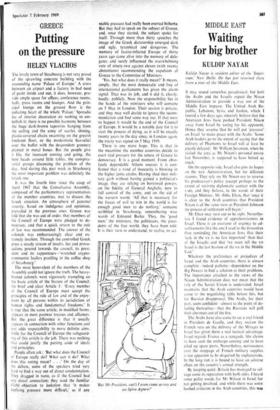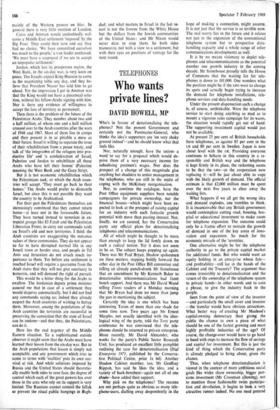Waiting for big brother
MIDDLE EAST KULDIP NAYAR
Kuldip Nayar is resident editor of the 'States. man,' New Delhi. He has just returned there from a tour of the Middle East.
It may sound somewhat paradoxical, but both the Arabs and the Israelis expect the Nixon Administration to provide a way out of the Middle East impasse. The United Arab Re- public, Lebanon, Syria and Jordan, which I toured a few days ago, sincerely believe that the • American Jews have pushed President Nixon away from Israel by voting for his opponent. Hence they assume that•he will put 'pressure' on Israel 'to make peace with the Arabs.' Some Arab leaders go to the extent of saying that the delivery of Phantoms to Israel will at least be greatly delayed : Mr William,Seranton, when he visited the area as Mr Nixon's personal envoy last November, is supposed to have hinted as much.
On the opposite side, Israel also pins its hopes on the new Administration, but for different reasons. They rely on Mr Nixon not to reverse his predecessor's policy (except perhaps to the extent of reviving diplomatic contact with the LAO, and they believe, in the words of their Foreign Minister, Mr Abba Eban, that 'once it is clear to the Arab countries that President Nixon is of the same view as President Johnson the process of settlement will begin.'
Mr Eban may turn out to be right. Neverthe- less I found evidence of apprehensiveness in Israel. There is an overtone of urgency to ad- vertisements like the one I read in the Jerusalem Post reminding the American Jews that their 'task in the us is no less important' than that of the Israelis and that 'we must tell the us Israel is the last bastion of the us in the Middle East.'
Whatever the preferences or prejudices of Israel and the Arab countries, there is almost complete—indeed pathetic—dependence on the Big Powers to find a solution to their problems. • The importance attached to the views of the Nixon Administration does not mean that the role of the Soviet Union is underrated. Israel maintains that the Arab countries would have come to the negotiating table before this, but for Russian disapproval. The Arabs, for their part, seem confident—almost to the point of de- luding themselves—that the Russians will pull their chestnuts out of the fire.
The Arabs have also come to see a real friend in President de Gaulle, and they reckon the French veto on the delivery of the Mirages to Israel has given them a real tactical advantage. Israel regards France as a renegade. She claims to have seen the embargo coming and to have piled up spare parts. Nevertheless, nervousness over the stoppage of French military supplies is too apparent to be disguised by explanations. In the long run it is bound to have an adverse effect on the country's armed strength.
By keeping quiet, Britain has managed to sal- vage some its reputation with both sides. I heard some polite words for Mr Wilson in Israel for not getting involved, and while there was some hushed criticism in the Arab countries, this was mainly of the Western powers en bloc. In general there is very little mention of London.
Cairo and Amman would undoubtedly wel- come a Middle East settlement 'imposed' by the Big Four. They could then turn and say they had no choice. 'We have committed ourselves too much to the people,' a UAR leader confessed. 'We must have a scapegoat if we are to accept an unpopular settlement.'
Jordan, which lost its prosperous region, the West Bank, in the six-day war, is very keen on peace. The Israelis expect King Hussein to come to the negotiating table any day, and they be- lieve that President Nasser has told him to go ahead. Yet the impression I got in Amman was that the King would not have a piecemeal solu- tion, without his fellow-Arabs signing with him. Nor is there any evidence of willingness to accept the loss of territory as permanent.
Then there is the problem of the future of the Palestinian Arabs. They number about two and a half million, of whom one and a half million crossed over to the Arab countries after the wars of 1948 and 1967. Most of them live in camps and their present is in as pitiable a mess as their future. Israel is willing to separate the issue of their rehabilitation from a peace treaty, and talk of 'the integratkon of the refugees into pro- ductive life' and 'a confederation of Israel, Palestine and Jordan to rehabilitate all those Arabs who have left their homes' (Palestine meaning the West Bank and the Gaza Strip).
But it is not economic rehabilitation which the Palestinians seek, or which the Arab coun- tries will accept. 'They must go back to their homes.' The Arabs would prefer to dismantle Israel, but since this is not possible they want the country to be Arabianised.
For their part the Palestinians themselves are increasingly convinced that they cannot return home—at least net in the foreseeable future. They have turned instead to terrorism in ex- tremist groups like El Fatah and the Palestinian Liberation Front, to carry out commando raids on Israel's old and new territories. I think the Arab countries are exaggerating the nuisance values of these commandos. They do not appear so far to have disrupted normal life in any Israeli town or border area, and people in Tel Aviv and Jerusalem do not attach much im- portance to them. Yet before any settlement is reached Israel will require a guarantee from the Arab states that they will not give sanctuary to terrorists, and will demand the right of pursuit.
This would be a bitter thing for the Arabs to swallow. The Jordanian deputy prime minister assured me that in case of a settlement they would disperse automatically, but I did not find any commando saying so; indeed they already suspect the Arab countries of wishing to betray them. Moreover, among the populations of the Arab countries the terrorists are successful in preserving the conviction that the state of Israel can be undone—and that they, the Palestinians, can do it.
Here lies the real urgency of the Middle Eastern situation. To a sophisticated outside observer it might seem that the Arabs must have learned their lesson from the six-day war. But to the Arab populations that lesson is simply not acceptable, and any government which tries to come to terms with 'realities' puts its own sur- vival at risk. And while solutions imposed by Russia and the United States should theoretic- ally enable both sides to save face, the degree of control which each of the great powers has over those in the area who rely on its support is very limited. The Russians cannot control the fellah or prevent the ritual public hangings in Bagh- dad; and what matters to Israel in the last re- sort is not the frowns from the White House but the dollars from the Jewish communities of the United States : and Mr Nixon would never dare to stop them. So both sides manoeuvre, not with a view to a settlement, but with their eyes on positions of vantage for the next round.







































 Previous page
Previous page